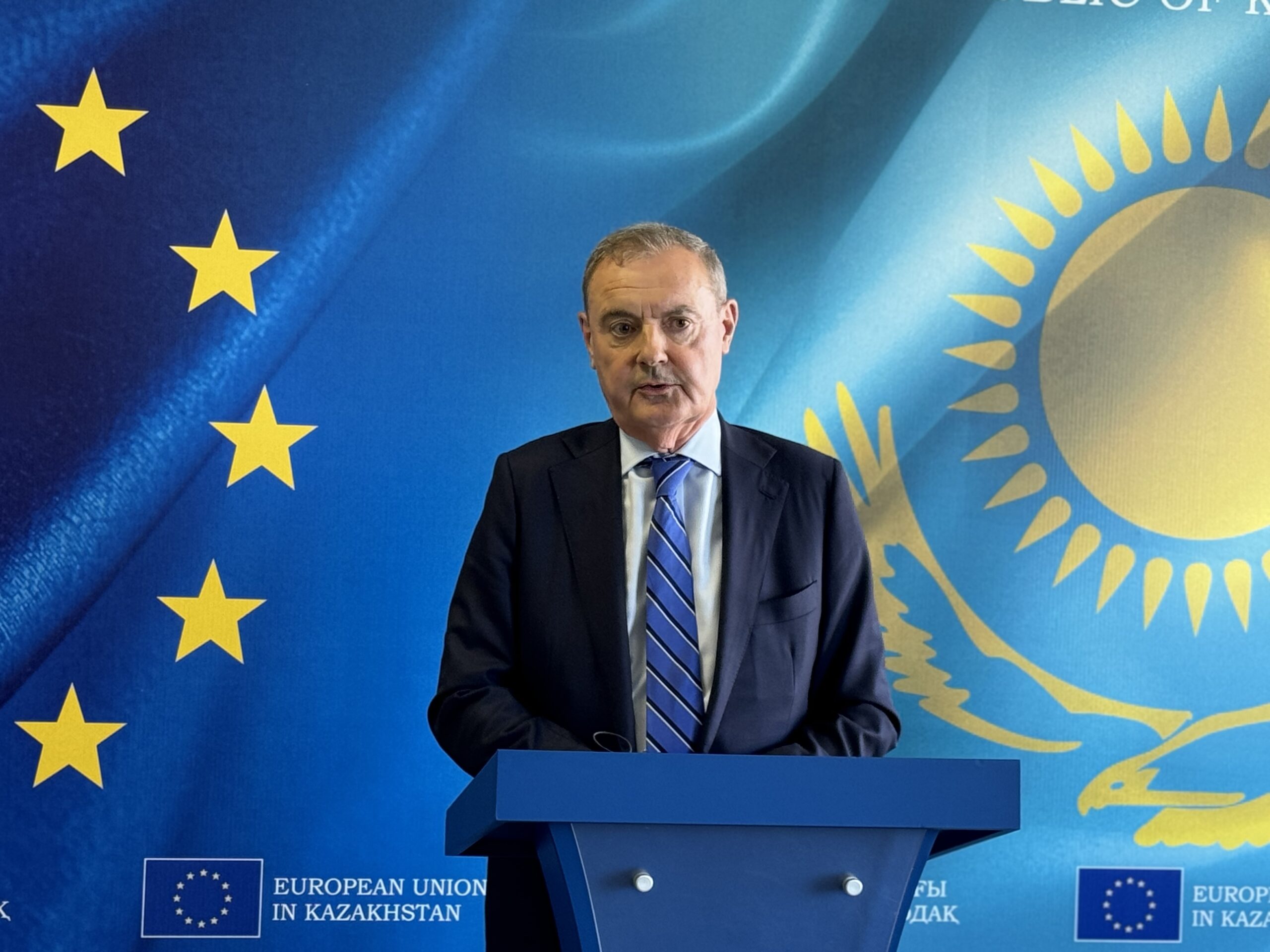ASTANA – European Union (EU) Sanctions Envoy David O’Sullivan commended the progressive decline in the import and re-export of dual-use sanctioned items to Russia via Kazakhstan during a June 18 press briefing in Astana as he wrapped up his third visit to the country.

David O’Sullivan was appointed as EU Sanctions Envoy in December 2022 and formally began this role in the second half of January 2023. Photo credit: Assel Satubaldina / The Astana Times
He had earlier visited Kazakhstan in April and November last year. The EU envoy’s current visit included high-level meetings with Kazakh authorities, including Deputy Prime Minister Serik Zhumangarin, to reinforce the importance of supporting Western-imposed sanctions.
“We have all been pleased to note that since April of last year we have seen a progressive decline in the import and re-export of these products through Kazakhstan, and this has been continuing for some time. So this is a positive development seen from our perspective,” said O’Sullivan.
He commended Kazakhstan for its proactive measures and cooperation with the EU in this regard.
“A lot of progress made”
“On the specific issue of sanctions, there were a couple of problems that arose for Kazakhstan, where we have been able to make a lot of progress. I am thinking of the operation of the CPC [Caspian Pipeline Consortium] pipeline and the fact that Kazakhstan is now a very important supplier of oil to the European Union, for which we are very grateful,” he noted.
“There was also a very important issue for Kazakhstan of the immobilization of assets of the Eurasian Development Bank in Euroclear [a Belgium-based financial services company] in Brussels. After a lot of intensive work, particularly by the Belgian colleagues, we have been able to unfreeze that money, and it is now flowing to Kazakhstan and supporting projects in the country,” he said.
In February, the European Commission adopted the 13th package of sanctions against Russia. O’Sullivan stressed that the sanctions against Russia are aimed at preventing the entry of technologies for the development of military equipment, depriving the Russian government of revenue for financing the war, and imposing a high cost on its military-industrial complex.
He said the next package is being discussed now in Brussels.
“We have always been very respectful of Kazakhstan’s refusal to align with our sanctions, and we have never asked Kazakhstan to implement our sanctions. What we have asked is that they address potential issues of circumvention, and we have been always grateful for the assurances of the Kazakh authorities that they do not want Kazakhstan to be a platform for the circumvention of G7 sanctions, and, in particular, that they do not want to be such a platform for products which might have a military application,” said O’Sullivan.
He noted there is a specific subset of sanctioned products. This list, referred to as the list of Common High Priority items, also known as dual-use goods and advanced technology items, comprises 50 categories of items identified in Russian weaponry found on the battlefield in Ukraine.
“I prefer to call them the battlefield list because these are all products that the Ukrainian colleagues have found in Russian weaponry on the battlefield in Ukraine,” he said. “I want to emphasize that the trade in these products typically represents only about 1% of total trade. We really are talking about a very small range of products, both in volume and value, but it is the lethal nature of these products and the destructive use to which they are put by the Russian military that we wish to stop.”
While the decline in re-exports is a positive indicator, he emphasized the need for ongoing renewal and review of the efforts, which was a key reason for his current visit.
EU is Kazakhstan’s largest trading partner and source of investment
These efforts benefit from positive dynamics in the relations between Kazakhstan and the EU.
“The overall relationship between Kazakhstan and the EU is in very good shape. It is an important partner for us. We are your largest trading partner. We are also the largest source of foreign direct investment, and we have a very important strategic relationship. We are making very good progress on the commitments undertaken in the Enhanced Partnership and Cooperation Agreement [EPCA] to further strengthen our bilateral relations,” said O’Sullivan.
Data from the Bureau of National Statistics of Kazakhstan indicates that trade turnover with the EU reached $42.6 billion in 2023 out of the $139.8 billion in total foreign trade.
Between January and March, trade turnover between the EU and Kazakhstan hit $11.1 billion, up from $10.5 billion in the same period in 2023. Сumulative foreign direct investment (FDI) inflows from the EU surpassed $175 billion, according to data from the Kazakh government.
“Of course, there will always be challenges, and we will continue to raise those and face them, but I found today’s meetings extremely constructive. I hope that we can continue our good collaboration, in particular, in the broader context I mentioned earlier, of the overall development of our relations to which we attach a lot of importance,” he said.
He also spoke about visa facilitation for Kazakh citizens.
“We hope in the autumn to be able to launch negotiations on a visa facilitation agreement, which will further strengthen our cooperation and exchanges between our peoples,” he said.
The first step in this process was laid out during the visit of Kazakh Deputy Prime Minister – Foreign Minister Murat Nurleu to Brussels in May 2023, when he met with Ylva Johansson, European Commissioner for Home Affairs.
